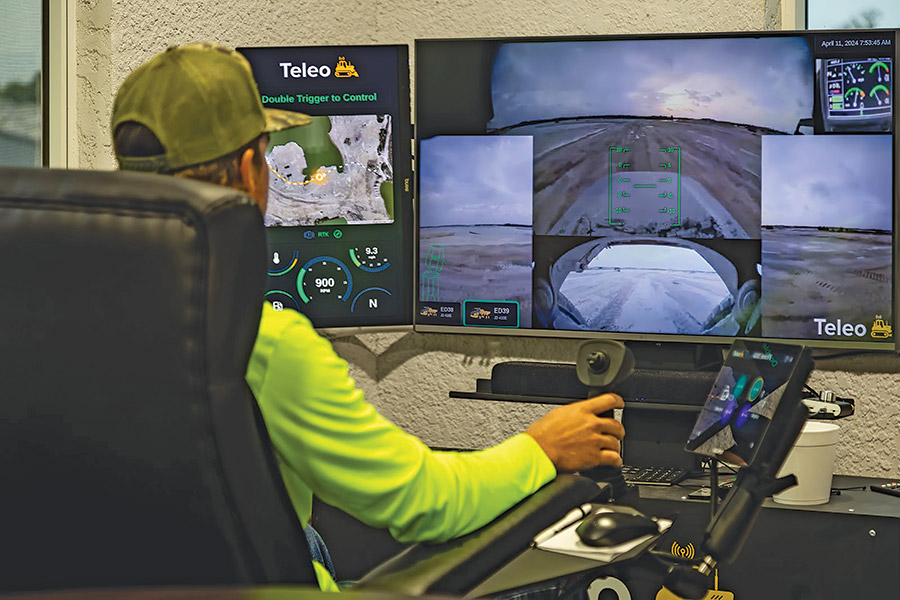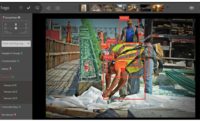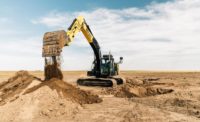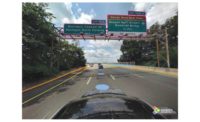Finding enough qualified workers to meet the current construction demand is a real challenge in many hot markets of the U.S. right now. So when Tomahawk Construction needed truck drivers to work on a residential project in Naples, Fla., it found itself instead sitting one driver down in its office 40 miles from the jobsite to remotely run three semi-autonomous articulated dump trucks.
“For the past few years, really ever since COVID, it seems like we’ve had a hard time getting these lower level positions in the door,” says Scott Lyons, co-owner of Fort Myers, Fla.-based Tomahawk Construction. Long commutes to jobsites and tedious work driving between dig sites and spill piles has made it hard to attract new drivers, he says. “We’ve had two or three trucks just sitting these past few years; couldn’t find anyone to run them.”
Lyons was approached by Teleo, a construction tech start-up based in Palo Alto, Calif. The company—founded by a few veterans of Lyft’s efforts to build Level 4 driverless, fully autonomous cars—began focusing its efforts on semi-autonomous construction equipment in 2019.
“I took the leap of faith and I’ve been happy with it. We don’t have any trucks sitting [idle] right now,” says Lyons. The project involves dewatering a lakebed and the construction of concrete pads for houses as part of a $30-million residential development. Lyons says running an excavator on wet ground is too precarious a task to trust to semi-autonomous operation, even though Teleo offers an excavator package. But having the three articulated dump trucks loading, unloading and in transit all at the same time makes a huge difference, he explains. “We put signs up [at the site] and are trying to keep people out of the area they operate in,” says Lyons. “The Teleo system with the AI is recognizing different kinds of vehicles around it, and they’re uploading different software [updates] where the trucks are learning more every day.”
Getting robots and semi-autonomous vehicles working in the somewhat chaotic environment of construction jobsites can be a challenge for those used to the controlled spaces of factory floors, but coming from attempts to get autonomous cars working on public roadways, construction seemed almost easier, notes Vinay Shet, CEO and co-founder of Teleo.
“We believe the path to full autonomy goes through human supervision,” says Shet. “[If you] have a person overseeing machines and giving input, you can take the simplest part of that machine’s work and let a human do the specific things.”

A remote operator can let the ADTs drive autonomously, and take over for complex tasks.
Photo courtesy Teleo
Teleo’s system is machine-agnostic, working on multiple major OEMs’ equipment and across a range of model years. The company’s focus is on the force multiplier of having one operator oversee multiple machines at once, rather than creating a fully autonomous piece of equipment. “Normally you have a person go to a jobsite, run a single machine, and when work stops, they stop,” says Shet. “But now you can have two machines on two different sites, with a single person switching between them.”
Deployment of a Teleo system is fairly straightforward. A control package is installed on the machine, and a custom mesh network is set up on site to ensure connectivity. The control station with its cab-style controls and multiple monitors can be hundreds of miles away when it logs into the machine through a standard high-speed internet connection. The Teleo AI-based system now relies on multiple cameras to identify hazards and navigate, but Shet says his team is looking into radar-based awareness for a future update.
Currently Teleo is selling its system through a network of distributors. Shet sees growth potential not only among contractors who feel strained by labor shortages, but in an expanded pool of potential operators as well. “With Teleo, you’re now sitting in a comfortable control station in an air-conditioned office, not in a machine in the field being tossed around. This can expand the operator base and attract a different set of people.”
“I’ve got to be honest: I don’t want any of my competitors on this,” Lyons says. “But it’s going to get out anyway. This thing is going to be a game changer.”






Post a comment to this article
Report Abusive Comment